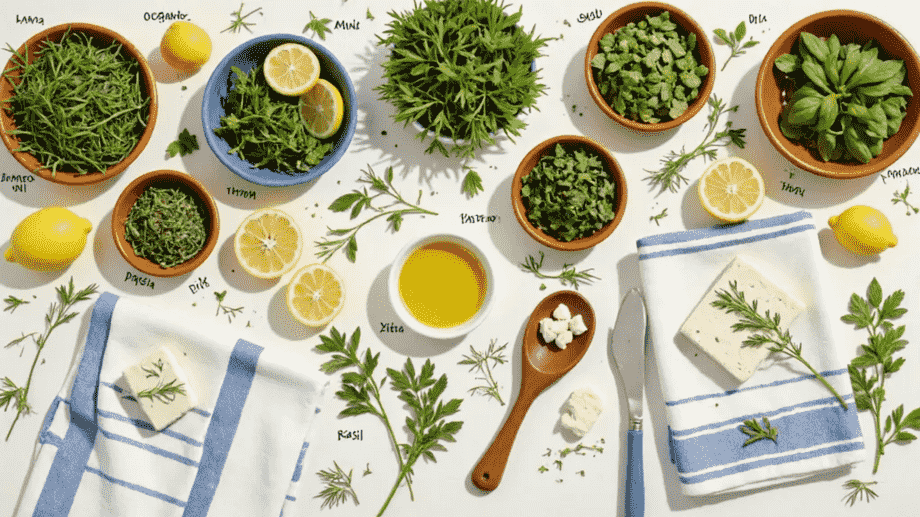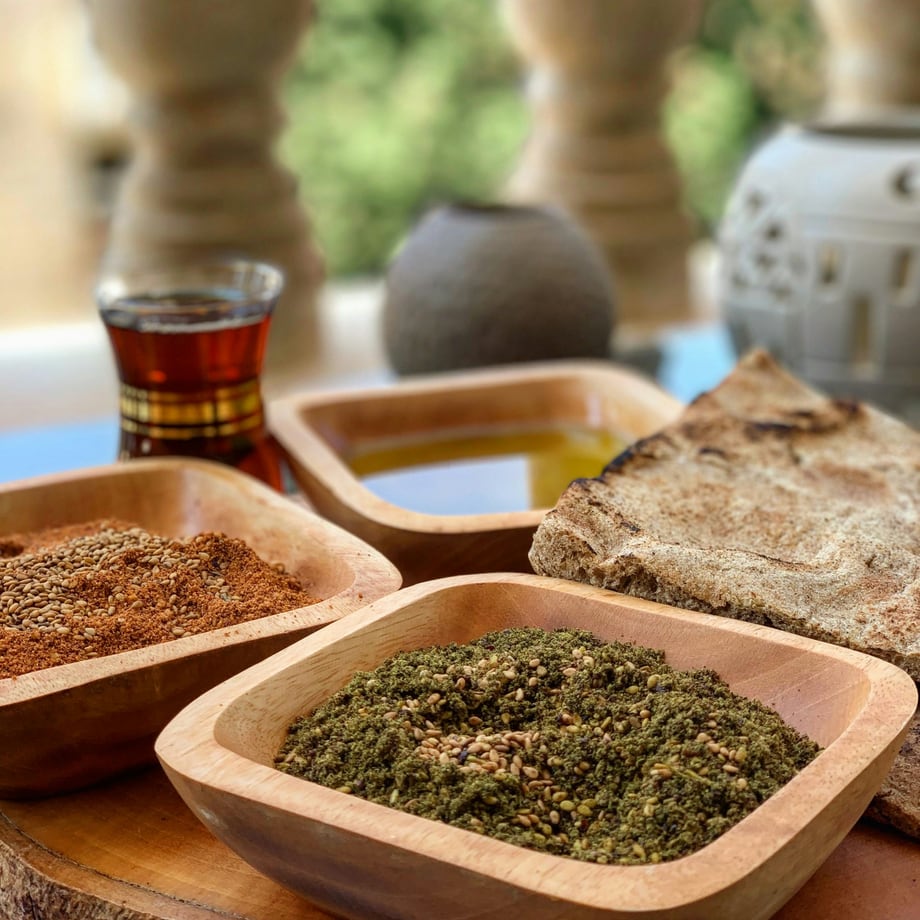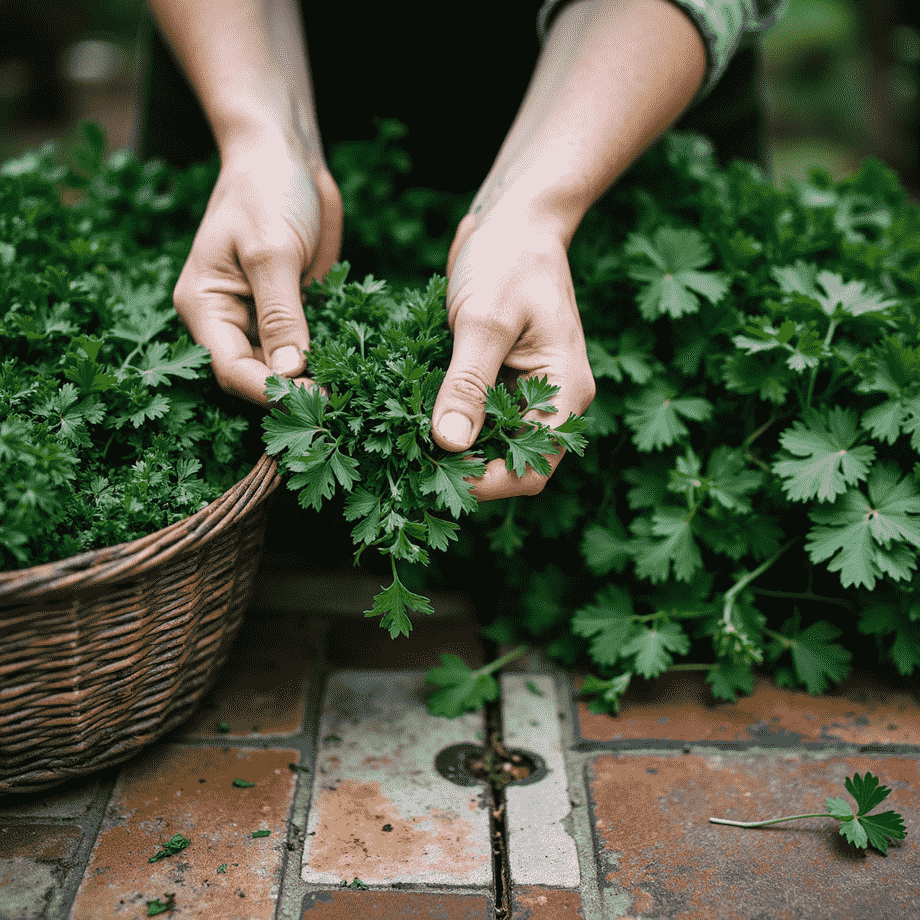Greek Herbs You Need in Your Kitchen (Flavorful Traditions for Everyday Cooking)
A handful of Greek herbs can bring sunshine to your kitchen, filling the air with earthy notes and treasured memories of the Mediterranean. Their flavors tell stories of olive groves, seaside gardens, and tables lined with fresh bread and ripe tomatoes. Cooking with these herbs isn’t just about taste, each pinch carries a piece of Greece’s long, flavorful tradition straight into everyday meals.
You’ll discover that just a sprinkle can wake up roasted meats, grilled fish, or even a simple salad. These are the same herbs that give classic recipes depth and warmth, making even weeknight dinners feel special. Whether you’re chasing aroma, authenticity, or the unique health benefits these herbs offer, the right Greek herbs bring color and comfort to your home cooking. For inspiration on how these flavors shape Greek favorites, see how a pinch of oregano works magic in this Healthy Greek Salad Recipe.
What Makes Greek Herbs Unique?
Greek herbs hold a special place in the kitchen that goes beyond flavor. These aromatic treasures come with roots that stretch deep into the history of the land, shaping the way people eat, gather, and heal. If you close your eyes while rubbing fresh oregano or a handful of mint, the scents rising from your hands can spark images of windswept hills, ancient ruins, and open air markets brimming with color. Greek herbs are not just ingredients, they are the very threads of Greek culture and tradition.
Deep Roots in Greek History and Culture
Greek herbs have seasoned meals for thousands of years, weaving stories into every dish. In ancient times, these herbs grew wild on rocky slopes and sun kissed fields, ready for anyone with an outstretched hand. They flavored both feasts and simple lunches, serving as a quiet link between generations. Key herbs such as oregano, thyme, and sage starred in festival breads and celebratory roasts and even found their way into soothing teas after long days.
Beyond the kitchen, Greek herbs shaped customs around the table. The sharing of food in Greek culture is a ritual built around warmth, generosity, and connection. You don’t just taste the meals, you taste history. Explore more about how tradition and hospitality come together in Greek kitchens in this detailed guide on Greek Hospitality and Food Traditions.
Flavor and Fragrance You Can’t Forget
The aroma of Greek herbs is bold and unforgettable. Wild oregano fills the air with notes of sun, sea breeze, and crushed earth. Mint brings a cool sweetness, while thyme and rosemary pack herbaceous depth into every bite. These scents aren’t only for the plate; they draw people together, sparking memories and longing for more.
Some Greek herbs even have unique varieties found nowhere else due to Greece’s special climate and mountain soils. The result is a truly local flavor, sharp, vivid, and alive. A pinch of Greek oregano or a sprig of mountain tea makes any meal sing, whether sprinkled over grilled lamb or blended into a rustic tomato sauce.
Rich Tradition of Culinary and Medicinal Uses
For centuries, families relied on Greek herbs for both taste and wellbeing. Oregano and bay leaves made stews richer, while mint freshened salads and stuffed grape leaves. These same herbs also filled healing teas, soothing coughs, calming stomachs, and easing aches.
It’s common in Greek kitchens to reach for herbs as the first remedy for everyday problems. Fresh thyme in hot water helps sore throats. Basil sits near windows to invite luck and freshen air. Sage was burned in homes for purity and strength.
If you enjoy discovering how classic herb rich dishes define the flavors of Greece, get inspired with this Tour of authentic Greek cuisine, which highlights many traditional uses.
A Living Connection to the Land
Greek herbs thrive in tough, stony soils, kissed by salt air and hot sun. Their strong aromas and oils are a direct reflection of the wild places they come from. When you cook with Greek herbs, you welcome a piece of that rugged beauty into your kitchen. The herbs aren’t just plants, they are memories of old villages, quiet afternoons, and lively gatherings under vine covered terraces.
Cooking with Greek herbs lets you taste not only the seasons and the soil, but also a living heritage. It’s a simple act that brings Greek sunlight and generosity to every meal.
Essential Greek Herbs for Your Kitchen
To truly capture the soul of Greek cooking, stocking your kitchen with the right herbs is key. These small green wonders are the reason Greek food tastes so unforgettable. Their scents can warm your heart and their flavors offer that lift which makes a dish sing. You’ll find both fresh and dried versions used in Greek kitchens, each adding a unique note to salads, stews, roasted meats, and even seafood. Here’s your essential guide to must have Greek herbs, each bringing its own touch of tradition, color, and goodness.
Oregano: The Heartbeat of Greek Flavors
Oregano lingers at the center of Greek cuisine. Its bold, earthy aroma drifts up from everything, from village salads to grilled lamb. Dried Greek oregano has a concentrated, almost wild scent, think of sunbaked hills and summer breezes. A pinch can wake up tomatoes, and a generous sprinkle finishes a salad with a fiercely Greek character.
You’ll notice oregano comes alive in classic dishes like Greek salad, roasted chicken, and even fresh bread. It does more than boost taste, oregano offers natural health benefits, too. High in antioxidants and thought to support your immune system, oregano proves both powerful and practical.
Typical uses:
- Sprinkled over Greek salads
- Scattered on roast potatoes or meats
- Mixed into tomato sauces and stews
Even a pinch of oregano in sauces like those for Garides Saganaki Shrimp Dish provides depth and a signature Greek aroma. Remember, dried oregano packs a punch, while fresh oregano gives a lighter, greener note.
Dill and Parsley: Fresh Notes for Vegetables and Seafood
Dill brings brightness to your table, especially in dishes tied to spring and seafood. Its feathery leaves have a soft, grassy taste with a hint of licorice, making every bite feel light and clean. Think about the famous spanakopita (spinach pie) or delicate fish fillets, a hint of dill lifts the whole dish.
Parsley, on the other hand, is crisp and peppery. Fresh parsley is a finishing touch in Greek kitchens, scattered across vegetable stews, soups, and fish dishes. It adds color and a breath of freshness to hearty bean soups and also works as a key ingredient in fillings for grape leaves.
Typical uses for dill and parsley:
- Blended into creamy sauces and salad dressings
- Muddled into spanakopita or pies
- Sprinkled over roasted vegetables
- Mixed with rice or grains for stuffed grape leaves, as seen in this Homemade Dolmadakia Recipe
Both herbs are used fresh for peak flavor, but you can toss dried dill into soups and stews if fresh is hard to find.
Mint, Basil, and More: Sweet and Peppery Accents
Greek mint is cool and refreshing, with a bright note that brings just the right contrast to savory dishes. You’ll spot it in salads, yogurt dips like tzatziki, and in the filling for stuffed vegetables. Mint’s cooling touch is perfect on hot summer days or in meals needing a fresh lift.
Basil offers a sweet yet peppery perfume. In Greece, it isn’t just used for cooking, it’s also a plant for good luck, found on windowsills. Greek basil varieties can be small, leaved and intensely aromatic. Use basil in salads with tomatoes and feta, or chopped over savory pies.
Other Greek herbs worth having include:
- Thyme: Woody and floral, perfect for grilled meats and root vegetables.
- Bay Leaves: Add a quiet depth to soups and slow cooked stews.
- Rosemary: Sharp and pine-scented, a staple for roasting.
- Fennel: Both the fronds and seeds give a mild anise aroma to seafood and salads.
Tips for using these herbs:
- Add fresh leaves at the end of cooking to maximize flavor.
- Use dried forms for slow cooked dishes, where flavors have time to soften.
- Combine mint or basil into cheese pies, like Sarikopites Pastry Recipe, for a touch of herbal sweetness.
Having these Greek herbs, in both fresh and dried forms, lets you shape flavors just like a Greek cook. Every sprinkle and handful brings you closer to truly authentic, heartwarming meals.
How Greek Herbs Shape Traditional Recipes
Greek herbs act like a painter’s palette for home cooks and chefs alike. Their fragrances and flavors fill kitchens, turning simple ingredients into comforting classics. Every Greek recipe carries the voice of the landscape mountains, seas, and sun in every herbaceous handful. When you cook with traditional Greek herbs, you bring authenticity and vibrancy to every dish, whether it’s a familiar favorite or something brand new.
Greek Herbs: The Heartbeat of Classic Dishes
Picture a table set with dolmadakia, savory pies, and steaming pots of stew. What ties all these recipes together? Greek herbs. Oregano and dill take the lead in stuffed vine leaves, their punchy and bright notes blending with lemon and tender rice. If you want to taste the magic in your own kitchen, nothing beats following a Homemade Dolmadakia Recipe, where every roll is perfumed with dill, mint, and parsley.
Herbs make each bite memorable and connect you to the roots of Greek home cooking. In spanakopita (spinach pie), dill and parsley brighten the creamy filling, turning everyday greens into something special. Thyme and mint add a secret strength to savory pies, balancing the richness of cheese and pastry. Even a dash of oregano on roasted potatoes wakes up the whole dish with warmth and depth.
Bringing the Land and Tradition to Your Table
Greek herbs do more than flavor food, they tell stories of the countryside. Recipes often call for generous measures: tossing handfuls of herbs into meatballs, crumbling bay leaves into soups, or sprinkling mint over cool yogurt dips. Cooking becomes a celebration of the season and the land.
If you’re looking for inspiration, explore the top 10 traditional Greek dishes to try, where you’ll spot the signature of Greek herbs everywhere. Fresh parsley crowns a bowl of beans. Dill and mint sweep through lemony chicken soup. Rosemary and thyme join lamb as it roasts, filling the air with a wild, aromatic scent.
Why Greek Herbs Matter in Everyday Meals
Greek herbs give each recipe a backbone, making food taste richer and more connected to its place of origin. These herbs are not just for celebration, they show up in weekday dinners, light lunches, and family feasts alike. By learning how oregano, dill, mint, and basil shape such a wide range of dishes, you can cook with confidence and creativity, whatever’s in your pantry.
Traditional recipes rely on these herbs the way a melody relies on its notes. From Homemade Dolmadakia Recipe to savory pies and hearty stews, each sprinkle is a nod to centuries of flavor and love. The next time you reach for one of these Greek herbs, you’re not just following a recipe; you’re sharing in a history that’s alive with every meal.
Cultivating and Storing Greek Herbs at Home
Fresh Greek herbs at your fingertips change the way you cook. Growing them at home connects you to their vivid scents and flavors, while smart storage keeps that Mediterranean sunshine alive all year long. You don’t need sprawling gardens or perfect soil to start, just a corner of sunlight, a little patience, and the right care. Bring authentic Greek taste into your kitchen, even when your market is low on fresh sprigs.
Growing Greek Herbs: Pots, Gardens, and Simple Success
Greek herbs love warmth and sun, just like in their native hillsides. You can easily grow favorites like oregano, thyme, mint, and dill in pots or window boxes if you don’t have garden space. All you need is a sunny spot at least six hours of light a day.
- Sunlight: Place pots or beds where herbs get plenty of direct sunlight. South-facing windows work well indoors.
- Soil: Choose a loose, well drained mix for pots. Outdoor beds should have soil with good drainage, since Greek herbs don’t like “wet feet.”
- Watering: Water when the top inch of soil dries out. Overwatering drowns the roots and dulls flavor.
- Trimming: Snip the tips often, especially before the herbs start to flower. This keeps plants bushy and flavorful.
- Spacing: Don’t cram the pots herbs like space for their roots to breathe.
Greek herbs suit small spaces, balconies, or even bright kitchen windowsills. Imagine picking a handful of mint right when you need it or snipping oregano for your morning eggs. Each little harvest offers a direct line to the fields of Greece.
Harvesting: Timing is Everything
Pick Greek herbs early in the morning after the dew dries and before the hot sun lifts their precious oils. The best flavor comes when plants are full but not yet flowering.
- For leafy herbs (mint, basil, parsley): Take young, tender shoots for the best taste.
- For woodier herbs (rosemary, thyme, oregano): Snip stems with plenty of leaves, but leave some behind so the plant keeps growing.
- Always use clean scissors or pruners to avoid bruising the leaves.
Regular harvesting keeps Greek herbs productive and flavors bold.
Storing Greek Herbs: Keeping Flavor Alive
To enjoy Greek herbs year-round, you need simple storage methods that lock in their unique flavors. Each herb keeps best with a little care:
Drying:
Hang small bunches upside down in a warm, dry, and well-ventilated room. Once they’re crisp, strip the leaves and store in airtight jars away from light. Dried oregano, thyme, and sage hold flavor beautifully. For a deeper dive into preserving flavors at home, the National Center for Home Food Preservation gives helpful tips.
Freezing:
Chop fresh herbs like dill, parsley, or mint, and freeze in ice cube trays with water or olive oil. Pop them into soups or sauces for fresh taste long after the growing season ends.
Refrigerating:
Bundle leafy herbs like parsley and mint in damp paper towels, then place them in a sealed bag in the fridge. They’ll stay perky for a week or more.
| Herb | Best Storage | Storage Life (approx.) |
|---|---|---|
| Oregano | Air-dried | 6-12 months (dried) |
| Mint | Refrigerated | 1-2 weeks (fresh) |
| Dill | Frozen | 6 months (frozen) |
| Parsley | Refrigerated | 1-2 weeks (fresh) |
| Thyme | Air-dried | 6-12 months (dried) |
Store their aromas in your pantry, and you can always have the heart of Greek flavor, ready for any recipe. These practices don’t just save flavor—they spark memories, turning even ordinary recipes into a taste of the Mediterranean.
Health Benefits of Cooking with Greek Herbs
When you reach for Greek herbs in your kitchen, you’re adding more than just layers of flavor, you’re bringing an age old form of healthy living into each dish. These herbs have played a role in wellness since ancient times, with every sprig, leaf, and pinch carrying natural compounds that support your health. Their earthy and vibrant scents do much more than tease your appetite; they help you feel your best, inside and out.
Rich in Antioxidants for Everyday Wellness
Greek herbs like oregano, thyme, and sage are high in antioxidants. These natural substances help shield your body from the strains of daily life. Antioxidants do the heavy lifting, protecting your cells from stress and keeping your body feeling younger, longer.
For example, oregano packs more antioxidant power per gram than nearly any other herb you’d find on your spice rack. A sprinkle over salad or chicken doesn’t just improve flavor; it offers a boost for your health that you’ll taste in every bite.
Gentle Support for Digestion
Greek herbs play a quiet but important part in making food easier to enjoy and digest. Mint and dill, for example, are old favorites for calming an upset stomach or helping you feel less bloated after a rich meal. When you add them to dishes, you invite gentle relief that generations have trusted.
Remember the way tzatziki’s cool mint soothes after spicy or heavy foods, or how a sprig of dill in soup leaves your stomach feeling light. These herbs have long been part of household remedies, turning simple meals into sources of comfort.
Traditional Remedies for Everyday Ailments
Many Greek herbs have deep roots in folk medicine. Thyme, sage, and bay leaf are not just powerful in sauces and roasts, they’re also a first line of defense against sniffles and sore throats.
- Thyme oil has been used as a natural aid for coughs and breathing.
- Sage tea comforts a scratchy throat and offers a moment of calm.
- Mint tea helps when stress or digestive troubles slow you down.
Families still turn to these herbs for simple self care, proving that old wisdom has staying power. You’ll find stories of healing and tradition woven into kitchens and home gardens all over Greece. Their impact has even echoed around the world, sparking interest in the natural health side of the Mediterranean lifestyle. Explore more about the Greek cultural impact globally and see how these traditions continue to shape food and health practices beyond Greece.
Heart Health and the Mediterranean Way
Greek herbs form a big part of the Mediterranean eating style, famous for keeping hearts healthy. Regular use of oregano, rosemary, and parsley helps lower inflammation, support healthy cholesterol, and add bold taste without the need for excess salt or fat.
Herbs like these are at the center of plant forward diets that doctors now recommend for wellness and longevity. For a deep look at how this style of eating ties into wellness, explore the Cretan Diet Explained, where Greek herbs are the stars of daily meals.
Plant-Based Nutrients in Every Bite
Greek herbs deliver a daily dose of vitamins and minerals with each handful or pinch.
- Parsley is loaded with vitamins A, C, and K, giving your immune system a gentle push and bones added strength.
- Basil and dill bring in calcium and potassium, balancing the herbs’ rich flavors with extra nutrition.
Cooking with Greek herbs turns every meal into a smart choice for flavor and health, helping you build habits that last. By blending these traditional herbs into your home cooking, you give your meals the taste of sunshine, and the support of centuries old healthy living.
Conclusion
Bring Greek herbs into your kitchen and you welcome the spirit of Greece itself sunny, fragrant, and full of tradition. With just a few fresh sprigs or dried handfuls, your meals can bloom with color and aroma, each bite connecting you to generations of flavor and health.
Be bold. Toss oregano on roasted vegetables or add mint to a cool yogurt dip. Try your hand at classic recipes or improvise with herbs in eggs, breads, and even salads.
Every time you cook with Greek herbs, you keep a living heritage alive in your home. Let their fresh and earthy scents fill your kitchen, and share the story of Greek fields and family tables with every meal you make. Thanks for joining in, bring your own voice and touch to these traditions, and invite a taste of Greece into everyday life.













